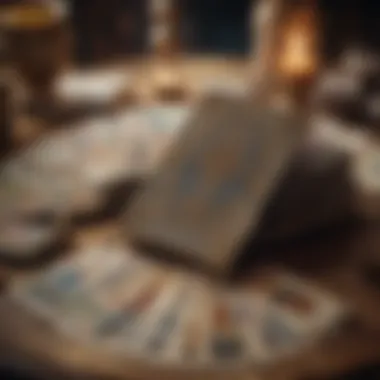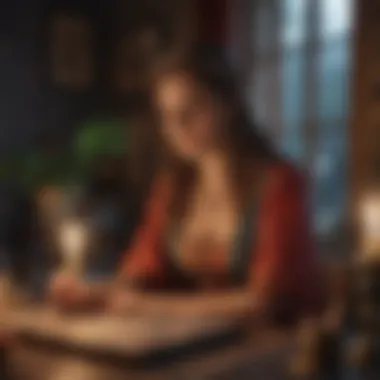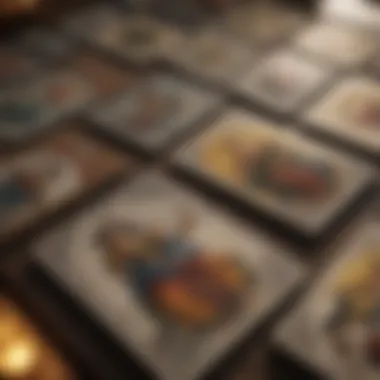Exploring Tarot as a Profession: Insights and Opportunities


Intro
Tarot reading has seen significant evolution, transitioning from a mystical pastime to a professional discipline. As society has grown increasingly curious about spirituality and self-discovery, tarot has emerged as a captivating avenue for personal and professional exploration. This article will delve into the foundation of a career in tarot reading, mapping out the necessary skills, and providing insights into various career paths in this unique field. It will also address the importance of ethical considerations and personal branding, crucial components for success.
Zodiac Sign Overview
General Traits
Understanding the zodiac signs can enrich a tarot reader's practice. Each sign embodies distinct characteristics that can influence the individual seeking guidance. Recognizing these traits allows tarot professionals to create more personalized readings. For instance, an Aries might be more inclined to take risks, while a Taurus values stability. Understanding these nuances helps in tailoring the reading experience to suit the querent's nature.
Element and Modality
The twelve zodiac signs can be grouped according to three modalities: cardinal, fixed, and mutable. Each modality signifies a different way of responding to the world.
- Cardinal Signs (Aries, Cancer, Libra, Capricorn): These signs initiate action, embodying leadership qualities.
- Fixed Signs (Taurus, Leo, Scorpio, Aquarius): These are known for their determination and steadfastness.
- Mutable Signs (Gemini, Virgo, Sagittarius, Pisces): These signs adapt easily and are flexible in their approaches.
This categorization allows tarot readers to understand the inherent behavior patterns of their clients, enhancing the interpretation of cards in a reading.
Strengths and Weaknesses
Every zodiac sign carries strengths and weaknesses that may surface during tarot readings.
- Strengths may include resilience, creativity, and analytical skills.
- Weaknesses often manifest as impulsiveness, stubbornness, or emotional indifference.
A tarot reader can use this knowledge to address personal challenges that clients face, bringing clarity to their inquiries and aiding in their journey towards personal growth.
Detailed Horoscope Analysis
Daily Horoscope Breakdown
A daily horoscope serves as an accessible tool for readers. It can provide insights into daily energies and events based on the alignment of celestial bodies. By keeping track of such predictions, tarot professionals can better align their readings with current astrological influences. This method ensures more relevant and timely advice for clients.
Weekly and Monthly Predictions
Incorporating weekly and monthly predictions into tarot readings can unveil larger patterns in a client’s life. Understanding overarching themes can guide readers in providing holistic counsel, allowing individuals to make informed decisions.
Key Planetary Influences
Planets play a vital role in shaping astrological energies. Tarot readers should become familiar with the influences of key celestial bodies such as:
- Mercury: Communication and intellect
- Venus: Love and relationships
- Mars: Action and ambition
By integrating this knowledge, tarot readers can enhance their readings with a richer context that reflects not just tarot cards but also planetary dynamics.
Astrology for Personal Growth
Understanding Birth Charts
A birth chart provides a fundamental insight into one's personality, strengths, and potential challenges. Tarot readers can benefit from understanding their clients’ birth charts to offer tailored advice. Incorporating astrological insights into tarot work not only enriches the reading but also positions the reader as a more informed and holistic practitioner.
Tips for Embracing One's Zodiac Traits


To fully utilize astrological insights, clients should be encouraged to embrace their zodiac traits. This might include:
- Journaling personal experiences related to zodiac attributes.
- Engaging in discussions on zodiac traits with others.
- Seeking additional resources for deeper learning.
Astrological Practices to Enhance Life
Astrology can be leveraged in practical ways as well. Practices like lunar rituals or seasonal celebrations aligned with zodiac signs enhance self-awareness. Tarot readers can suggest such practices, creating a more supportive environment for personal growth.
Embracing the duality of tarot and astrology can create a powerful framework for personal growth and client guidance.
This foundational understanding underscores the necessity for tarot readers to grasp astrological elements that enhance their professional practice. Combing these two fields equips readers with an extraordinary tool that enriches their interactions with clients, fostering both personal and professional development.
Intro to Tarot as a Profession
Understanding tarot as a profession is crucial for anyone interested in exploring this field. Tarot reading is more than just a tool for divination; it can also serve as a meaningful career choice. The domain of tarot includes a blend of psychological insight, intuition, and spiritual connection. By examining this profession's intricacies, we can identify its unique opportunities and challenges. This section sets the stage for a deeper exploration of the skills required, ethical considerations, and potential career paths within tarot.
Defining Tarot and Its Historical Context
Tarot originates from playing card games in the 15th century in Europe. Initially, the cards were not used for fortune-telling. Instead, they were part of a game called tarocchi, played by nobility. However, by the late 18th century, tarot began to capture the imagination of mystics and occultists. Scholars and practitioners started to speculate on the cards' meanings and potential for insights into one's life.
In modern times, tarot decks have evolved significantly. The traditional tarots, like the Marseille and Rider-Waite decks, have laid the groundwork for countless interpretations and artistic variations. Each card in a tarot deck is imbued with symbolism, which can offer profound interpretations based on a reader’s intuition and the context of the inquiry.
The Evolution of Tarot Reading in Modern Society
Today, tarot reading stands at a unique intersection of self-exploration and professional practice. The 20th century witnessed a surge in interest in alternative therapies and spirituality. This period marked a shift in the perception of tarot from mere entertainment to a serious tool for introspection and guidance.
People now approach tarot reading not only for entertainment but also for personal development. Various sectors, including wellness and mental health, incorporate tarot as a tool for therapy and counseling. Moreover, the internet allows tarot readers to reach a global audience, increasing the accessibility of this practice. Digital platforms and online communities have fostered a new wave of interest, broadening the scope of what it means to be a tarot reader today.
The presence of tarot in popular culture signifies its transformation over decades. Understanding this evolution is vital for any aspiring tarot professional.
In summary, recognizing the historical roots and modern significance of tarot as a profession can set a solid foundation for those looking to engage seriously in this field. As we continue, we will delve into the necessary skills, ethics, and various career options available to aspiring tarot readers.
Skills and Qualifications for Tarot Readers
Understanding the skills and qualifications necessary for tarot readers is central to navigating this unique profession. Anyone wishing to pursue a career in tarot must focus on developing a specific set of abilities that can greatly enhance their effectiveness and credibility. As tarot reading is not merely a mystical activity, but can also be very much seen as a form of personal counseling or guidance, the importance of tailored skills cannot be overstated.
Intuitive Abilities and Emotional Intelligence
Intuition plays a pivotal role in tarot reading. Successful readers often possess strong intuitive abilities that help them interpret the cards in a meaningful way for their clients. This ability comes from a combination of experience, sensitivity, and an open mind. It is not just about reading the symbols on the cards; it is about understanding how these symbols relate to the client's situation.
Alongside intuition, emotional intelligence is critical. A tarot reader frequently encounters individuals who are grappling with deep emotional issues. Being able to empathize with a client and respond appropriately is crucial for building trust. This fosters a safe environment where clients feel comfortable sharing personal details. Effective readers assess not only the cards but also the emotional states of their clients, creating a holistic reading experience.
Understanding Tarot Decks and Symbolism
A deep comprehension of the different tarot decks and their unique symbolism is vital for any aspiring tarot professional. There are numerous decks available, each with its own themes and artistry, from the classic Rider-Waite to the modern Tarot of the Magical Forest. Each deck can evoke different interpretations based on its illustrations, colors, and symbolism. Therefore, mastering the nuances of at least a few prominent decks is beneficial.
Additionally, understanding symbolism is about more than just knowing the meaning of each card. It involves grasping the wider context in which the cards function. Some symbols resonate with certain cultures or personal experiences. A knowledgeable reader explores these connections, allowing them to provide more personalized feedback to clients.
Communication Skills and Client Interactions
Effective communication is another cornerstone of tarot reading. A good reader must convey insights clearly and compassionately. The ability to articulate complex interpretations in straightforward terms is beneficial. This includes both verbal and non-verbal communication, as body language can often convey feelings just as much as spoken words.
Furthermore, establishing a rapport with clients plays a significant role in the overall effectiveness of the reading. Good interpersonal skills help tarot readers create an atmosphere conducive to open discussion. Listeners must balance offering insight with encouraging clients to voice their own interpretations and feelings. This fosters an environment for meaningful dialogue and personal exploration.


“Tarot reading is not about predicting the future, but helping individuals navigate their own journey with guidance and insight.”
Different Career Paths in Tarot Reading
The field of tarot reading offers a diverse range of career opportunities. Each path can cater to different skills, interests, and market demands. Understanding these various professional avenues is essential for anyone contemplating a career in tarot. This section not only illustrates the different routes available but also highlights the benefits and considerations of each path, helping aspiring tarot readers identify which direction aligns with their goals.
Freelance Tarot Reader
Becoming a freelance tarot reader is a common choice for many in this industry. This path allows for significant flexibility in terms of scheduling and locations. Freelancers often work in diverse settings such as private homes, public events, and community gatherings. Building a personal brand is key to attracting clients. Social media can play an important role in promoting services and showcasing skills.
However, freelancing requires self-discipline. Consistent marketing and networking are vital to maintain a steady flow of clients. Additionally, freelance tarot readers must navigate the administrative aspects of running their services, including invoicing and client communication.
Working in Holistic Centers and Spiritual Shops
Another avenue is working within holistic centers or spiritual shops. This environment tends to attract clients already interested in metaphysical practices, making it a fertile ground for tarot readings. Here, tarot readers often collaborate with other practitioners such as astrologers, energy healers, and herbalists.
Employment in these settings can provide a more stable income compared to freelancing. Many holistic centers also offer additional training and professional development opportunities. On the downside, hours may be less flexible, as these businesses often have set operating times. This can limit personal availability or the ability to take on additional freelance work.
Offering Online Tarot Services
The digital revolution has opened numerous possibilities for tarot practitioners. Offering online tarot services can attract a global clientele without the constraints of physical appointments. Platforms such as websites, social media, or dedicated tarot apps can facilitate virtual readings, allowing readers to connect with clients from anywhere.
Online services also allow for diverse formats, including video calls, chat sessions, or pre-recorded readings. While this mode can reach a broader audience, it does require an understanding of online marketing strategies and digital engagement. Additionally, building rapport through a screen may be different from in-person interactions, necessitating adaptation to communicate effectively.
Teaching Tarot Workshops and Classes
For those who have developed a robust understanding of tarot, teaching workshops or classes presents a rewarding opportunity. This career path involves sharing knowledge and skills with others, helping to cultivate a new generation of tarot readers. Workshops can vary from introductory courses to advanced topics, each attracting different audiences.
Teaching provides a sense of fulfillment and can create additional income streams. It also allows for the development of personal branding, positioning as an authority within the tarot community. However, conducting workshops requires planning, organization, and preparation to deliver valuable content effectively.
Choosing a career path in tarot reading demands reflection and self-awareness. Each option presents its own set of challenges and rewards. Ultimately, the right path will depend on personal preferences, skill sets, and professional goals.
Establishing a Tarot Practice
Establishing a tarot practice is a critical step for anyone who wants to turn their passion for tarot into a profession. It requires thoughtful planning and a clear strategy. Creating a formal practice allows tarot readers to define their unique place in a growing market, attract clients, and provide consistent services. Understanding how to manage this aspect of your career can bring stability and credibility, essential for long-term success.
Creating a Business Plan and Strategy
A comprehensive business plan is essential. It serves as a roadmap, detailing goals, target audience, and strategies for achieving success. Here are key components to consider:
- Identifying your niche: Determine what specific aspect of tarot you want to focus on. This could include areas like relationship readings, career guidance, or spiritual advice.
- Setting pricing and packages: Decide how to price your sessions. Consider offering different packages, such as single readings, monthly subscriptions, or group sessions.
- Marketing strategies: Establish how you plan to attract clients. This may include social media campaigns, collaborations with other professionals, or regular workshops.
- Financial projections: Estimate your initial investments and ongoing expenses. This should include marketing costs, any required certifications, and potential earnings.
A well-thought-out plan will give you direction and make it easier to measure your progress.
Legal Considerations and Business Registration
Navigating the legal landscape of operating a tarot practice is essential. This ensures compliance with local regulations and protects your business. Key considerations include:
- Business registration: Depending on your location, you may need to register your business with local authorities. This usually involves choosing a business structure, such as a sole proprietorship or an LLC. Registering provides legitimacy and can be crucial when dealing with taxes.
- Permits and licenses: Some regions may require specific permits for operating personal service businesses. Check local laws to ensure compliance.
- Insurance: Consider obtaining liability insurance. This can protect you from claims related to your services. Ensure you understand the extent of coverage and its implications.
- Tax obligations: Be familiar with your tax obligations as a self-employed individual. Keep thorough financial records and consult with a tax professional for advice.
Establishing proper legal standing gives you the confidence to focus on your craft while ensuring client trust and credibility in the marketplace.
Building a Clientele


Building a clientele is essential for any tarot reader who seeks to establish a long-term and sustainable practice. A solid client base not only provides financial stability but also enhances the overall experience of tarot reading. When clients return for readings, it indicates trust and satisfaction, which are vital in fostering a thriving practice.
Creating a clientele involves strategic marketing, effective communication, and community engagement. Each element plays a role in attracting and retaining clients, leading to personal and professional growth.
Marketing Your Tarot Services
Marketing is the backbone of a successful tarot reading business. Without effective marketing strategies, potential clients may never discover your services. Here are key aspects to consider:
- Creating a Unique Brand: Develop a brand identity that reflects your personality and intuition style. This may include defining your niche, style of readings, or specific tools you use.
- Setting Competitive Prices: Understand the market rates for tarot readings in your area and set competitive prices that reflect your expertise. Offering introductory rates can attract new clients.
- Offering Promotions: Run special promotions or discounts during holidays or events. Limited time offers can entice potential clients to take the plunge and book a reading.
Utilizing Social Media and Online Platforms
In today’s digital age, social media is a powerful tool for building a clientele. It allows tarot readers to reach a wider audience and create a community. Consider these approaches:
- Engagement on Platforms: Use platforms like Facebook, Instagram, and even TikTok to share insights, draw cards live, or showcase your readings. Regular posts can keep your audience engaged and interested.
- Building an Online Presence: Establish a professional website that features your services, testimonials, and a blog. A blog can provide valuable content that resonates with your audience while improving SEO.
- Hosted Online Events: Conduct live readings or webinars to showcase your skills. This not only enhances visibility but also gives potential clients a taste of what they can expect in a personal reading.
Networking Within the Community
Networking is invaluable in the tarot industry. Building relationships with other practitioners and businesses can lead to referrals and collaborations.
- Join Local Groups: Engage with local holistic or spiritual communities. Attend workshops, fairs, or expos to connect with others in the field.
- Collaborative Events: Partner with other tarot readers, psychics, or wellness practitioners to host events. This can broaden your reach and bring in clients from different networks.
- Attend Conferences: Participate in tarot or astrology conferences and meet like-minded individuals. This not only provides learning opportunities but also helps in building lasting connections.
Building a clientele requires patience and effort. However, the trust and satisfaction achieved through personal interaction create a rewarding experience for both the reader and the client.
Holding ethics in high regard is essential for both the tarot reader and the client.
Personal Growth and Development in Tarot
The journey into tarot reading is not only about interpreting cards and offering insights to clients; it also serves as a profound path for personal growth and self-discovery. As practitioners delve deeper into the tarot, they often encounter various aspects of their own psyche. This process can lead to enhanced self-awareness, emotional intelligence, and intuition.
Deepening Your Own Intuition
In tarot reading, intuition plays a crucial role. Developing this intuitive capacity is essential for anyone wishing to excel in this field. Intuition allows the reader to connect meaningfully with the cards and, subsequently, with the client.
To deepen one's intuition, tarot readers can engage in regular meditation practices. This helps clear the mind and enhances one's ability to listen to inner thoughts and feelings. Another effective method is to journal experiences with the tarot. Documenting readings not only provides insight but also reveals patterns over time. Additionally, engaging with other practitioners can broaden perspectives and introduce new ways to interpret the cards. It’s vital to trust one's instincts and develop a personal language with the tarot, enhancing both the connection to the cards and to oneself.
Continual Learning and Mastery of Tarot
Tarot is a vast field, and mastery does not come overnight. Continual learning is vital for growth as a tarot reader. This involves exploring various decks, studying different interpretations, and understanding evolving methodologies of reading.
Workshops and online courses can greatly assist in this endeavor. Many esteemed readers offer classes that cover both foundational knowledge and advanced techniques. Additionally, reading books written by credible authors in the tarot community can enrich understanding and offer new insights. Engaging in discussions on platforms such as Reddit encourages learning from the experiences of others.
Overall, personal growth in tarot reading not only enhances professionalism but also nurtures rewarding experiences for both the reader and their clients. Embracing this journey offers not only knowledge about tarot but also a greater understanding of oneself and one's place in the world.
Closure: The Future of Tarot as a Career
Exploring the future of tarot as a career reveals a landscape rich with potential. As society becomes more open to alternative practices, the acceptance and demand for tarot readers grows. This section examines key factors influencing the evolution of this profession.
Trends in Tarot Reading and Acceptance in Society
The trends surrounding tarot reading indicate a shift in public perception. Previously viewed through a lens of skepticism, tarot is now increasingly considered a valid tool for personal insight and guidance. Many people are seeking ways to address their mental health, emotional issues, and overall life direction, and tarot can provide support in these areas.
A few notable trends include:
- Therapeutic Use of Tarot: More practitioners are integrating tarot reading into therapeutic practices. This approach allows readers to serve as guides while facilitating deeper emotional exploration for clients.
- Digital Presence: With the rise of the internet, tarot reading has found a new home online. Social media platforms allow tarot readers to market their services, share insights, and connect with a global audience.
- Diverse Decks and Methodologies: The expansion of different tarot decks and methodologies caters to a wider audience. People look for decks that resonate with their values, culture, or spiritual beliefs, which helps them feel more connected to the practice.
- Inclusivity and Representation: As more people embrace their unique identities, tarot reading reflects this shift by becoming more inclusive. Readers are now encouraged to develop personal interpretations and understandings of the cards that resonate with diverse communities.
Given these trends, aspiring tarot practitioners should remain adaptable. Continuous learning and openness to change will be key in carving a sustainable career. Building a strong personal brand and utilizing technology will also enhance visibility and credibility.
"The future of tarot is not just about the cards, but how they serve as a mirror to our lives in a changing society."







